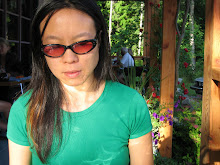Sunday, July 30, 2006
My sister Wendy has joined MSF and is on her way to the Congo shortly. I'm proud of her! (And just a leeetle worried...)
Thursday, July 20, 2006
New Vancouver Voices
New Vancouver Voices:
Simon Fraser Writer-in-Residence Consultees Reading
Come join outgoing Writer-in-Residence Larissa Lai for an inspiring and entertaining evening of readings by a few of the writers who have taken part in the Simon Fraser Writer-in-Residence program this year. Some extraordinary work has crossed her desk. Hear how the city speaks.
The event takes place at SFU Harbour Centre Room 1700 at 7PM, Wednesday, July 26, 2006.
Featuring:
Kit Wong
James Lewis
Colin Stewart
Myka Tucker-Abrams
Naava Smolash
Scott Drake
Christine Lyons
Neale Barnholden
Andrea Actis
Charles Pace
Laura Cardoso
Catherine McNeil
Simon Fraser Writer-in-Residence Consultees Reading
Come join outgoing Writer-in-Residence Larissa Lai for an inspiring and entertaining evening of readings by a few of the writers who have taken part in the Simon Fraser Writer-in-Residence program this year. Some extraordinary work has crossed her desk. Hear how the city speaks.
The event takes place at SFU Harbour Centre Room 1700 at 7PM, Wednesday, July 26, 2006.
Featuring:
Kit Wong
James Lewis
Colin Stewart
Myka Tucker-Abrams
Naava Smolash
Scott Drake
Christine Lyons
Neale Barnholden
Andrea Actis
Charles Pace
Laura Cardoso
Catherine McNeil
Sunday, July 02, 2006
Decolonizing Affect Theory
Attended Is Affect Multicultural? Decolonizing Affect Theory, a colloquium organized by Sneja Gunew and the Decolonizing Affect Theory Reading Group through the Centre for Women’s and Gender Studies at UBC last week. A few thoughts in the aftermath: I think it's absolutely necessary that thinking on affect theory be attached to a decolonizing project, as Gunew has done. Otherwise there's a real risk of a return to a kind of apolitical humanism in ways that reinforce all the power structures anti-oppression work of the last few decades has been trying to undo. It strikes me that much of this work tends to focus on the self, and on interpersonal communication. Work like Sara Ahmed's and Jackie Stacey's is important because it opens up the question of the subject and forces us to (continue to) query its construction. I think there is something particularly productive in explorations around mimesis, firstly, yes, because it asks those questions about subject construction, but secondly-- and this is something that needs to be addressed further-- it opens up the opportunity to interrogate mimicry that happens at a collective level. I'd wanted to jump in after Anna Gibbs's discussion of Wong Kar Wai’s film In the Mood for Love, because I think there was room there to talk about a kind of "national love" or a kind of longing for national subjectivity that was still possible in 1962 (the moment the film was set) and that has since been quashed. I'm talking, of course, about the longing for democracy in Hong Kong, a longing that I think comes from complicated interactions between the "local" (Chinese) and the British colonials (who held democracy up as an ideal even as they refused to open that possibility for the (HK) subjects of that empire.) (Of course, the local in HK is not local at all-- most of the Chinese people there are there as a consequence of historical forces that drew them to that region from other parts of China.) Any kind of "national love" in Hong Kong would have to spring from an acceptance of colonial occupation, and an idealization of those nation states to which HK has/had to look to understand itself-- Britain and China. And any mimesis of those collectivities would necessarily have to be troubled and imperfect. It would be really interesting to read the “mood for love” of the Maggie Cheung and Tony Leung characters in relation to a kind of thwarted love for nationhood and democracy. (And a horror of these crass things at the same time, if one were to read the cheating spouses of the film as direct metaphors.) It would be more interesting still to read this love in relation to the mimetic love of the Japanese boyfriend for the robot on the train to the future in Wong’s follow-up film 2046. Hm… there’s a paper… or a chapbook…






